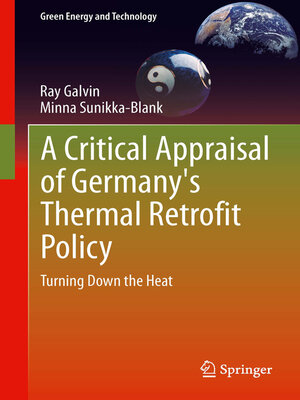A Critical Appraisal of Germany's Thermal Retrofit Policy
ebook ∣ Turning Down the Heat · Green Energy and Technology
By Ray Galvin

Sign up to save your library
With an OverDrive account, you can save your favorite libraries for at-a-glance information about availability. Find out more about OverDrive accounts.
Find this title in Libby, the library reading app by OverDrive.



Search for a digital library with this title
Title found at these libraries:
| Loading... |
Germany is seen as a leader in thermal retrofit policy and practice, but how effective is its approach? A Critical Appraisal of Germany's Thermal Retrofit Policy examines this policy in context and assesses its effectiveness. It finds that technical constraints and the costs of retrofitting reduce the rate of progress, while planning underestimates the influence of user behavior in the form of rebound and prebound effects. A key finding is that savings can be maximized within a policy that understands the actual behavior and motivation of households, the area where most energy savings are already taking place.
The book suggests a new policy paradigm that would encourage a better balance of partial and comprehensive retrofits, utilizing household behavior changes based on a better understanding of fuel saving motivation and fuel price elasticity. In this approach, the thermal building regulations would be made more flexible so that policymakers would:
- Promote partial, transitional and cost-optimal retrofits, which are more certain to pay back through fuel savings if they are appropriate to building typology and homeowner budgets.
- Promote comprehensive retrofits for reasons other than economic gain, focusing instead on the comfort and environmental benefits of energy-efficient homes.
-Invest more heavily in educating households to heat economically, learning from the prebound effect so as to maximize the utility of the homes they currently occupy, and base payback time calculations on actual consumption.
The results and findings of this book would be of interest to policymakers, researchers and graduate students alike.






